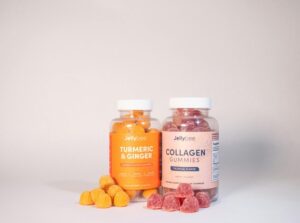
You might think that certain types of collagen could contribute to breast cancer risk, but current research doesn’t support that claim. In fact, collagen plays a vital role in maintaining healthy breast tissue. Yet, misconceptions abound, leaving many confused about its effects on health. Understanding the science behind collagen and its connection to breast health can clarify these myths and help you make informed choices about supplementation. What should you know to navigate this topic effectively?
Understanding Collagen: Types and Sources
Although you might’ve heard a lot about collagen in the context of beauty and health, it’s essential to understand its various types and sources.
Collagen primarily consists of several types, with Type I being the most abundant, found in skin, bones, and tendons. Type II is mainly present in cartilage, while Type III supports skin and blood vessels.
These types are sourced from both animal and plant origins. Animal-derived collagen often comes from bovine, porcine, or marine sources, known for their bioavailability. Additionally, collagen production declines after age 30, making supplementation more crucial for maintaining skin and joint health.
On the other hand, plant-based collagen boosters, like those from certain fruits and vegetables, provide amino acids that support collagen production in your body.
Understanding these types and sources can help you make informed choices regarding supplementation and dietary intake.
The Role of Collagen in the Body
Collagen plays a crucial role in maintaining the structure and function of various tissues throughout your body.
It’s the most abundant protein, found in skin, bones, tendons, and cartilage. This structural protein provides strength and elasticity, allowing your skin to remain firm and your joints to function smoothly.
Collagen also supports blood vessel integrity, promoting healthy circulation. As you age, collagen production decreases, leading to signs like wrinkles and joint stiffness.
Ensuring adequate collagen levels through diet or supplements can help maintain tissue health. Foods rich in vitamin C, like citrus fruits and leafy greens, also support collagen synthesis.
Common Myths About Collagen and Cancer
Understanding collagen’s vital functions in the body can help clarify some misconceptions about its relationship with cancer.
One common myth is that collagen supplements directly cause breast cancer. However, current research doesn’t support this claim.
Another misconception is that all types of collagen are harmful. In reality, collagen is a natural protein essential for maintaining healthy tissues.
Additionally, some believe that consuming collagen-rich foods can increase cancer risk, but these foods are generally safe and nutritious.
Lastly, there’s a notion that collagen injections can lead to tumor growth, which lacks scientific backing.
The Science Behind Collagen and Breast Health
While the relationship between collagen and breast health may not be widely understood, research indicates that collagen plays a crucial role in the structural integrity of breast tissue.
Collagen fibers provide support and elasticity, helping maintain the shape and firmness of the breasts. This protein also facilitates the repair and regeneration of tissues after injury.
Inadequate collagen levels can lead to weakened tissue structure, potentially affecting overall breast health. Additionally, collagen serves as a signaling molecule, influencing cellular behavior and promoting healthy cell function.
What Research Says About Collagen and Breast Cancer Risk
Research indicates that an adequate level of collagen may play a role in influencing breast cancer risk. Studies have shown that collagen, as a structural protein in connective tissues, supports cellular integrity and function.
When collagen levels are low, it can lead to tissue degradation and inflammation, both of which may contribute to tumor development. Some research suggests that specific types of collagen, such as Type I, play a vital role in maintaining breast tissue health.
However, the connection between collagen supplementation and breast cancer risk remains unclear, with conflicting findings in existing studies. It’s important to approach the topic with caution, as more research is needed to fully understand how collagen impacts breast cancer risk and overall breast health.
Safe Sources of Collagen: What to Consider
When considering your collagen intake, it’s important to focus on safe sources that can support your overall health. Look for collagen derived from high-quality sources, such as grass-fed bovine, wild-caught fish, or free-range chicken. These sources often contain fewer additives and contaminants compared to lower-quality alternatives.
Additionally, consider collagen that’s certified by third-party organizations, ensuring purity and safety standards. Pay attention to the extraction methods used; enzymatically processed collagen is generally preferable, as it retains its beneficial properties.
Also, if you have dietary restrictions, plant-based collagen boosters, like certain fruits and vegetables rich in vitamin C, can promote your body’s natural collagen production. Prioritizing these factors will help you make safer choices for your collagen needs.
Making Informed Choices About Collagen Supplements
Many people find themselves overwhelmed by the variety of collagen supplements available today. To make informed choices, start by researching the types of collagen—such as Type I, II, and III—and their specific benefits.
Look for products that are backed by scientific evidence and sourced from reputable manufacturers. It’s crucial to check for third-party testing to ensure purity and potency.
Additionally, consider your dietary needs, as collagen can come from animal or marine sources. Pay attention to ingredient lists to avoid fillers and additives.
Lastly, consult with a healthcare professional to discuss your individual health goals and any potential interactions with medications. Making informed choices enhances your chances of reaping the benefits of collagen safely and effectively.






